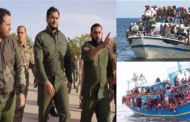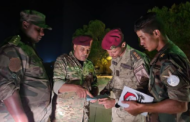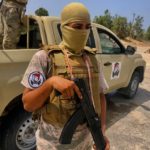In Al-Wattia, the spokesman for the Libyan Army Mohammed Ganunu said the Air Force warplanes had targeted Al-Wattia airbase with three airstrikes, hitting military vehicles and positions for Khalifa Haftar’s forces.
In Al-Wishka, the spokesman for the Sirte-Jufra operations room Abdelhadi Drah said a number of fighters from Haftar’s forces had been killed after Libyan Army’s artillery shelling targeted their positions.
In Tripoli, the Media Center for Operation Volcano of Rage, announced that innocent civilians were killed and injured as a result of shelling by Haftar militias on the neighborhood of Zanata.
AL-WATTIA
- the spokesman for the Libyan Army Mohammed Ganunu said the Air Force warplanes had targeted Al-Wattia airbase with three airstrikes, hitting military vehicles and positions for Khalifa Haftar’s forces. The media office of Burkan al-Ghadab Operation said the Air Force also hit an ammunition depot inside Al-Wattia airbase and the security brigade of Haftar’s forces, killing two fighters and injuring five others.
AL-WISHKA
- the spokesman for the Sirte-Jufra operations room Abdelhadi Drah said a number of fighters from Haftar’s forces had been killed near Al-Wishka after Libyan Army’s artillery shelling targeted their positions on May 3 dawn, adding that the shelling destroyed as well a rocket launcher and several military vehicles for Haftar’s forces.
- the spokesman for Sirte-Jufra Operations Room Abdelhadi Drah said the air defenses of the Government of National Accord (GNA) forces had downed a drone for Khalifa Haftar’s forces in Al-Wishka as it was trying to target GNA positions in the area. Drah said in a press briefing that GNA forces had destroyed military vehicles for Haftar’s forces as they attempted to advance on Alloud frontline in southern Abu Grein.
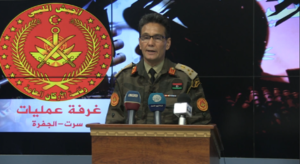
TRIPOLI
- the Media Center for Operation Volcano of Rage, announced that innocent civilians were killed and injured as a result of shelling by Haftar militias on the neighborhood of Zanata in Tripoli on May 1. The Center added that Haftar militias indiscriminately targeted this civilian area with Grad rockets, and published pictures showing ambulances in the vicinity of the attack and images of collateral damage caused to the properties of innocent bystanders.
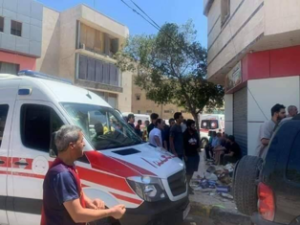
- Ahmed Abu Saad, the Head of Greater Tripoli Dignitary Council, a prominent member of the Muslim Brotherhood Group, was killed fighting with the militias of the Tripoli-based Government of National Accord (GNA) against the Libyan National Army (LNA) in Wadi al-Rabi’ axis in Tripoli, a military sources to Saa 24 News.
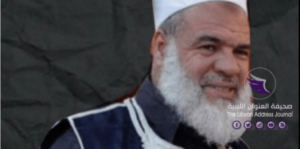
- the Libyan National Army (LNA) succeeded on April 28 in repelling attack by the Turkey-backed armed groups at Al-Mashroo and the airport road axes in Tripoli. LNA Military Information Division confirmed that this morning LNA forces succeeded in removing three bodies of the armed groups after they fled in front of army strikes.
- the Libyan Health Ministry said on April 27 that Khalifa Haftar’s indiscriminate shelling on Garabulli in eastern Tripoli killed a woman and her son.
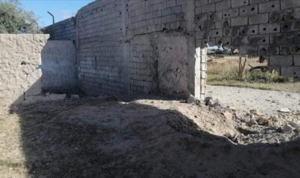
INTERNATIONAL RELATIONS
- the president of the United Nations Security Council, (UNSC), Sven Jurgenson, said that the “self-coronation” of Haftar is not helpful in solving the Libyan crisis. Speaking to journalists in a virtual press conference, Jurgenson added: “We do not see a military solution to the problem; it has to be a political solution”. He expressed his deepest regret over the ongoing and repeated violations of the truce, saying a ceasefire has to be agreed upon.
- Algeria has reiterated its concrete position on the Libya crisis based on the respect of the free will of the Libyan people and under the relevant UN Security Council resolutions. On May 1, the Algerian Ministry of Foreign Affairs expressed great concern about the recent developments in the situation in Libya, calling on the parties to the crisis to intensify efforts in order to reach a political solution.
- UNSMIL urged Libyan parties to seize upon calls for a truce to resume the 5+5 Geneva Joint Military Talks. UNSMIL’s call comes on the back of the unilateral humanitarian Ramadan ceasefire announced by Khalfa Haftar’s Libyan National Army (LNA) on April 29 and on the back of its conditional rejection on May 1 by the internationally recognized Libyan government in Tripoli.
- Moscow calls on all parties to the conflict in Libya to immediately cease hostilities and resume dialogue under the auspices of the UN, Russian Foreign Ministry spokeswoman Maria Zakharova said.
- the nature of the Libyan crisis has changed after foreign interference and the arrival of mercenary fighters, as well as the violation of the arms embargo, French Foreign Minister Jean-Yves Le Drian said in a speech to the National Assembly on April 30.
- the conflict in Libya will not end with “unilateral decisions,” France said, in response to Khalifa Haftar’s unilateral declaration of becoming the ruler of Libya. In a statement, Olivier Gauvin, the deputy spokesman for the Foreign Ministry, emphasized the conflict in Libya can only be solved through bilateral dialogue.
- spokesman for the Egyptian Foreign Ministry, Ahmed Hafez, affirmed Egypt’s adherence to the political solution and the principle of searching for a political settlement to the conflict in Libya, despite the differences between the Libyan parties on how to implement it.
- the Turkish Foreign Ministry has called on the international community to urgently respond to Khalifa Haftar’s move to declare himself the ruler of Libya, saying he aims to establish a military dictatorship.
- the Tunisian President Kais Saied, confirmed on April 28, his country’s recognition of the internationally recognized Government of National Accord (GNA) as the legitimate ruling body of Libya, saying that the wishes of the Libyan people must be respected.
- Tunisia rejected on April 28 the accusations made against it of allowing Turkey to use Tunisian military bases to provide the necessary supplies to the Tripoli-based Government of National Accord (GNA).
- the US ambassador to Libya Richard Norland has reiterated that the Libyan Political Agreement and its associated institutions are the sole internationally recognized framework for Libya’s governance and political transition.
- the United States said it regrets Khalifa Haftar’s unilateral ‘‘suggestion that changes’’ Libya’s UN-brokered Libyan Political Agreement (LPA). Khalifa Haftar had in fact announced, and not suggested, that he had revoked rather than amended the LPA in a televised address last night, on April 27.
- Russia has described power grab by Khalifa Haftar as “surprising”, state news agency RIA cited a foreign ministry source as saying. According to a statement by The Kremlin on April 28, Russia believes a political and diplomatic process is the only way to resolve the conflict in Libya.
- Russia on April 27 urged international mediators to refocus from trying to solve the Libyan crisis to working to get warring sides into direct talks. Approaches to conflict settlement must be worked out by rival Libyan groups, while outside players should try to bring them to the negotiating table and find common ground, said Foreign Minister Sergey Lavrov, speaking to the students of the Moscow Institute of International Relations via video link.
- the Acting head of UNSMIL, Stephanie Williams, has welcomed the eight-point political initiative proposed by Libya’s House of Representatives (HoR) head Ageela Saleh. Williams called it a ‘‘positive’’ sign as she considered it an ‘‘all-inclusive…call for the return to political dialogue (as opposed to the current fighting) within the framework of the Berlin Conference’s outcomes (which are within the framework of the 2014 Libyan Political Agreement).



